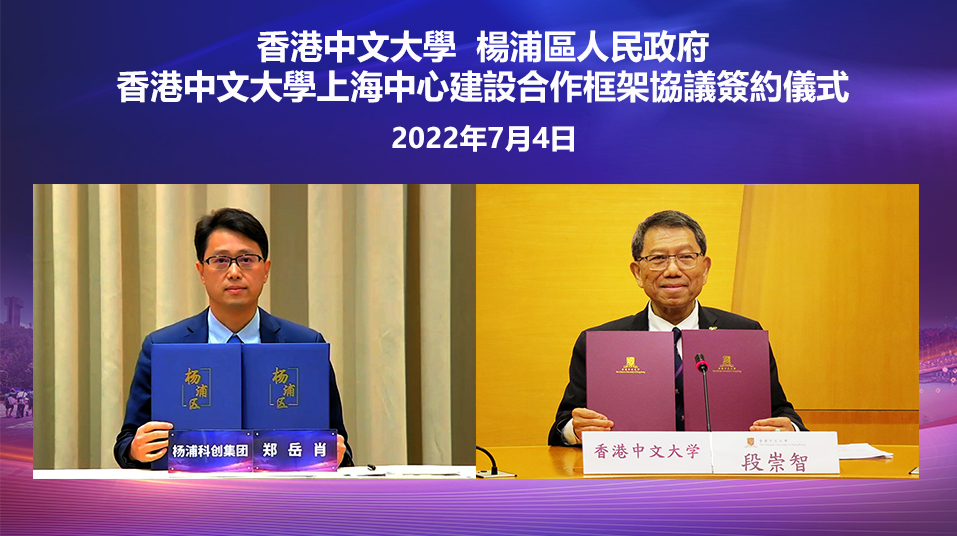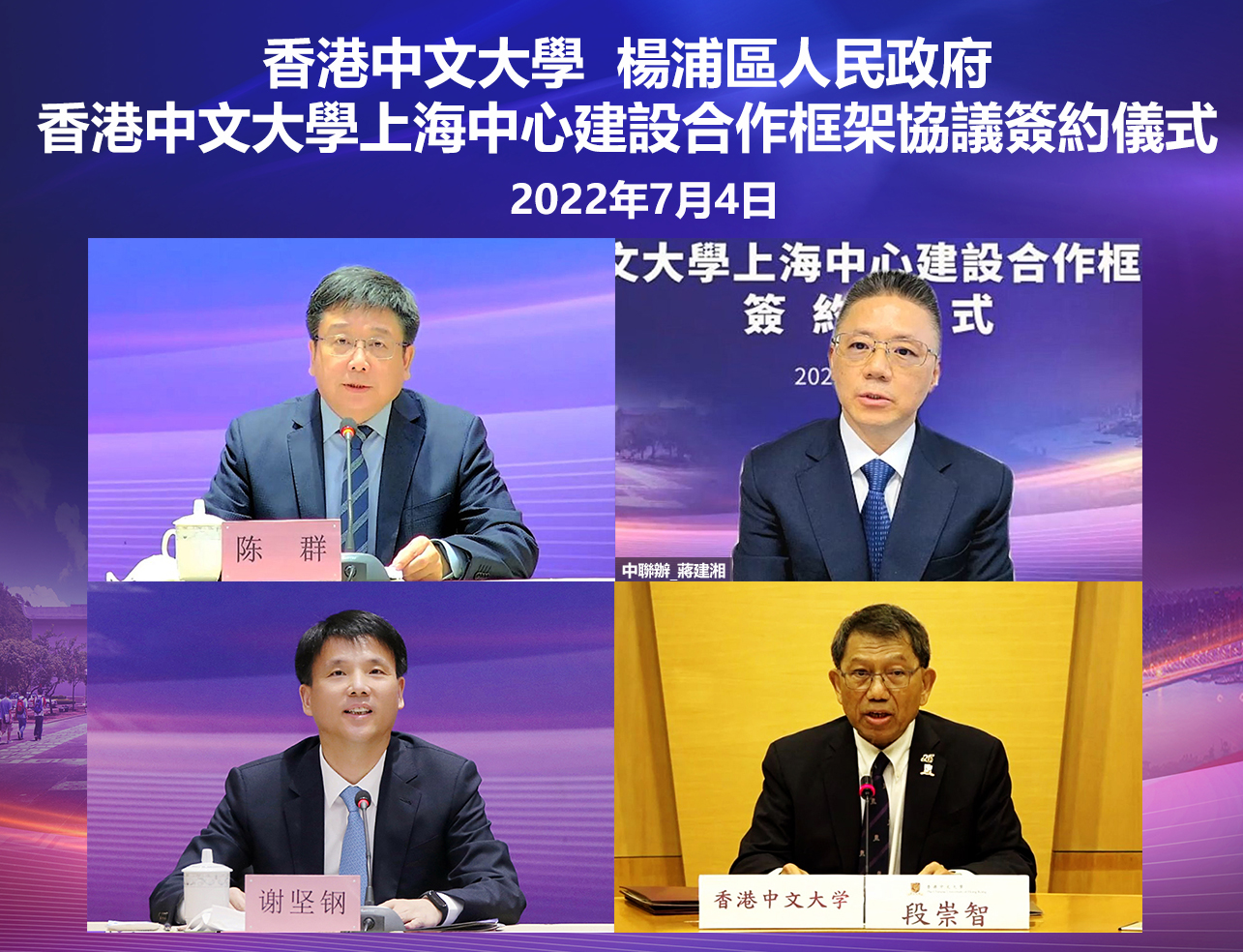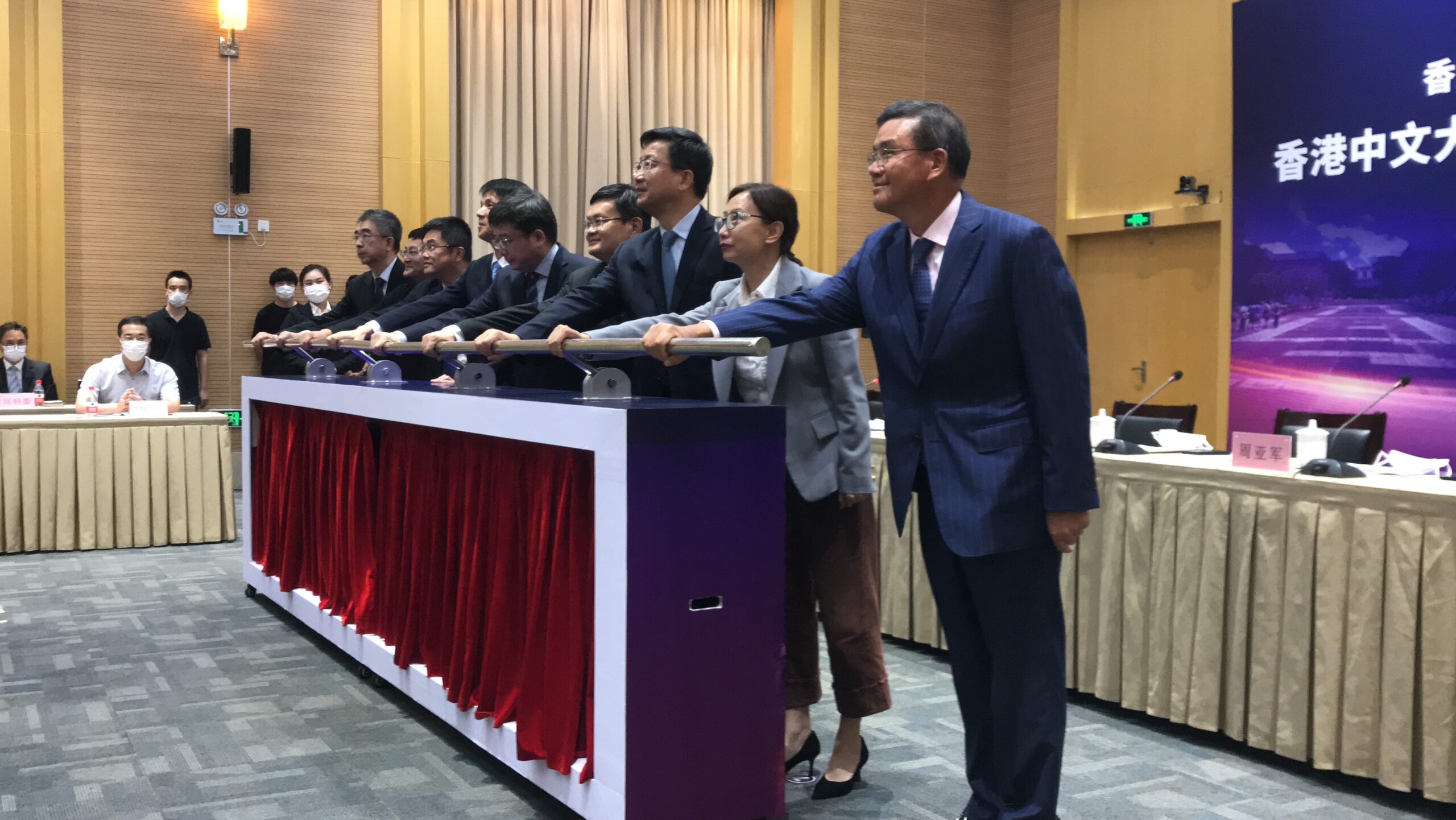CUHK Sets Up Shanghai Centre in Yang Pu District
 A group photo of all participants attending the signing ceremony of collaboration framework agreement.
A group photo of all participants attending the signing ceremony of collaboration framework agreement.
 CUHK Vice-Chancellor Prof. Rocky Tuan (left) and Mr. Zheng Yuexiao, Chairman of the Board of Shanghai Yangpu Science and Technology Innovation (Group) Co., Ltd. sign the collaboration framework agreement.
CUHK Vice-Chancellor Prof. Rocky Tuan (left) and Mr. Zheng Yuexiao, Chairman of the Board of Shanghai Yangpu Science and Technology Innovation (Group) Co., Ltd. sign the collaboration framework agreement.
 Officiating guests at the signing ceremony include Mr. Chen Qun, Deputy Mayor of Shanghai (upper left); Mr. Jiang Jian-xiang, Director of Science and Technology Department, Liaison Office of the Central People’s Government in the Hong Kong SAR (upper right); Mr. Xie Jiangang, Yang Pu District Party Secretary (lower left); and CUHK Vice-Chancellor Prof. Rocky Tuan (lower right).
Officiating guests at the signing ceremony include Mr. Chen Qun, Deputy Mayor of Shanghai (upper left); Mr. Jiang Jian-xiang, Director of Science and Technology Department, Liaison Office of the Central People’s Government in the Hong Kong SAR (upper right); Mr. Xie Jiangang, Yang Pu District Party Secretary (lower left); and CUHK Vice-Chancellor Prof. Rocky Tuan (lower right).
 Mr. Albert Ng, CUHK Global Alumni Advisory Board Member, on behalf of CUHK unveils the plaque of the CUHK Shanghai Centre with Shanghai representatives.
Mr. Albert Ng, CUHK Global Alumni Advisory Board Member, on behalf of CUHK unveils the plaque of the CUHK Shanghai Centre with Shanghai representatives.
On the heels of the 25th anniversary of the establishment of the Hong Kong Special Administrative Region, The Chinese University of Hong Kong (CUHK) has signed a collaboration agreement with Shanghai Yang Pu District Government on 4 July to support the establishment of CUHK Shanghai Centre. Participating guests of the signing ceremony comprised Professor Rocky Tuan, Vice-Chancellor and President of CUHK; Mr. Chen Qun, Vice-Mayor of Shanghai; Mr. Jiang Jian-Xiang, Director-General of the Education, Science and Technology Department, Liaison Office of the Central People’s Government in the HKSAR; Mr. Wang Ping, Director of Shanghai Municipal Education Commission; and Party Secretary Mr. Xie Jian-Gang and Mayor Xue Kan of Yang Pu District Government. Professor Alan Chan, Provost of CUHK; Professor Chan Wai-Yee, Pro-Vice-Chancellor of CUHK, joined the ceremony alongside the CUHK alumni, and representatives from the Offices and Work Departments of the Yang Pu District Committees and Bureaus as well as Shanghai Yang Pu Science and Technology Innovation (Group) Co., Ltd., and Shanghai Penta Innovation and Entrepreneurship Institute. VC Professor Tuan and Shanghai Yang Pu Technology and Innovation Group’s Chairman Zheng Yue-Xiao signed the framework agreement. Vice-Mayor Chen Qun and Yang Pu District Party Secretary Xie Jian-Gang unveiled the Centre’s plaque, marking the official admission of CUHK in the District.
Professor Tuan said in his speech: ” CUHK 2025 and its development strategy in engagement of China clearly indicates the importance to follow the national 14th Five-Year Plan, to further strengthen the development in the GBA, Shanghai, Beijing and other regions. Establishing CUHK’s Shanghai Centre is a key element of the University’s development plan on the mainland. On top of supporting the integrated development of the Yangtze delta, it will foster innovative and professional talent development, scientific and technological collaboration, and academic exchange. Leveraging both cities’ resources, the Centre will work with Yang Pu District to curate innovative talent training programmes and provide an exchange platform for entrepreneurs, scholars and students from both places. Government, colleges and enterprises are sure to benefit.”
“I hope both sides can fully utilize their respective advantages to nurture high-quality talent, deepen cooperation in key areas, serve the new development vision and make the Chinese University of Hong Kong Shanghai Centre an important link for Shanghai-Hong Kong integration,” Vice-Mayor Chen said during the ceremony.
Mr. Jiang said: “I hope the newly established CUHK Shanghai Centre can become a successful example of cooperation between Hong Kong universities and the Yangtze River Delta region. The Liaison Office of the Central People’s Government in the HKSAR will continue to support CUHK and other Hong Kong universities to collaborate with mainland partners, serving as a good platform to bolster exchange in science and technology as well as higher education and to give full play to Hong Kong’s strengths to contribute to the needs of the country.”
CUHK has been proactive in building links with the mainland. It has collaborated with increasing frequency with institutions in Shanghai, partnering with the Chinese Academy of Science, Fudan and Shanghai Jiao Tong Universities to co-establish State Key Lab of Synthetic Chemistry and joint research centers, carry out research collaboration, develop joint programmes, and organize faculty and student exchanges. In 2021, in partnership with SenseTime, the University and the Shanghai Artificial Intelligence Laboratory set up the CUHK Artificial Intelligence and Interdisciplinary Research Institute to break new ground in AI.
Housed in Shanghai Penta Innovation and Entrepreneurship Institute, Yangpu’s university hub, the Centre will be a focal point for academic conferences, forums, innovation and entrepreneurial activities. It will help CUHK forge closer ties with universities and enterprises on the mainland, facilitate cross-disciplinary research, and become a meeting place for alumni in Shanghai and east China.




